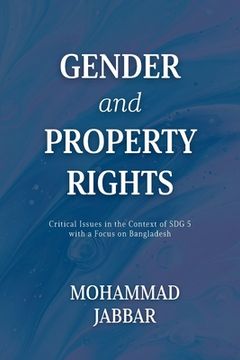Share
Gender and Property Rights: Critical Issues in the Context of SDG 5 with a Focus on Bangladesh (in English)
Mohammad Jabbar
(Author)
·
FriesenPress
· Paperback
Gender and Property Rights: Critical Issues in the Context of SDG 5 with a Focus on Bangladesh (in English) - Jabbar, Mohammad
$ 15.39
$ 21.99
You save: $ 6.60
Choose the list to add your product or create one New List
✓ Product added successfully to the Wishlist.
Go to My WishlistsIt will be shipped from our warehouse between
Monday, May 13 and
Tuesday, May 14.
You will receive it anywhere in United States between 1 and 3 business days after shipment.
Synopsis "Gender and Property Rights: Critical Issues in the Context of SDG 5 with a Focus on Bangladesh (in English)"
On their list of 17 Sustainable Development Goals for all nations, the United Nations uses #5 "to achieve equality and empower all women and girls". One of the nine targets under goal 5 is 'gender equality in the ownership of productive assets, especially land, by 2030". When it comes to achieving gender equality in developing countries like Bangladesh, women and men's equal access to property is generally seen as a goal that is universally desirable.But what if this were a wholly inappropriate metric for measuring and achieving gender equality by 2030 across diverse situations in the developing world-and Bangladesh in particular? This is exactly the case author and development expert Mohammad Jabbar makes in this impressive, thoroughly researched work of non-fiction. Among other acute insights, he argues SDG target on gender equality is asset ownership by 2030 may be ill-suited for the rural Bangladeshi context because of . . . - The inappropriate use of the concept of "household" over that of "family" as a survey unit for measuring its attainment - The potential for the creation of superfluous junk statistics for monitoring progress that measure ownership and use rights not indicative of actual gender (in)equality - The general lack of understanding it displays of local laws, customs and norms of gender, inheritance, and other vital concepts related to asset ownership.Thoughtful in its conception and precise in its execution, this carefully argued piece of academic research is sure to make a useful-even necessary-addition to the bookshelves of anyone interested in development and gender equality, whether they be academics, policymakers, researchers, students, or laypeople.
- 0% (0)
- 0% (0)
- 0% (0)
- 0% (0)
- 0% (0)
All books in our catalog are Original.
The book is written in English.
The binding of this edition is Paperback.
✓ Producto agregado correctamente al carro, Ir a Pagar.

